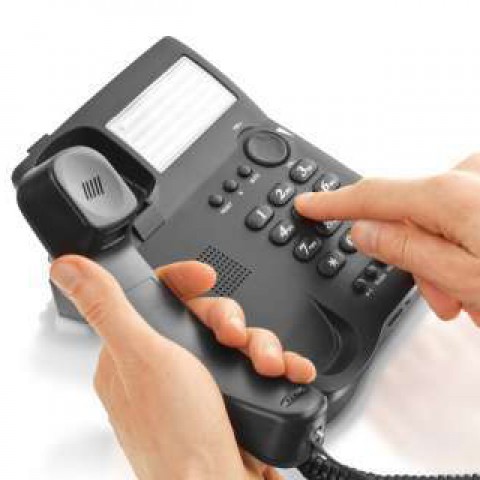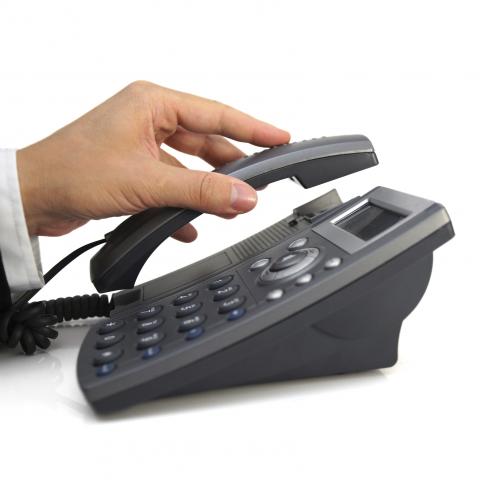
Does the thought of having a phone conversation in a foreign language put you on edge?
Making and receiving phone calls in one’s mother tongue can be stressful enough, but doing so in a foreign language represents a particular brand of challenge. In fact, it’s rather common to feel comfortable having an in-person conversation in a foreign language but to become shaky when it comes to handling phone calls in that language. If you give it a bit of thought, it’s easy to see why a Hebrew phone conversation may be a taller order for language learners than a face-to-face conversation.
For starters, experts claim that much of our communication is non-verbal. In the context of a traditional phone call, you can see just how tricky things can get when we’re confined to abstract spoken language, without the ability to reference non-verbal cues such as facial expressions or hand gestures. This is particularly true in the Middle East, where locals tend to use their hands as moving punctuation marks. While the increasing availability of video call technology means you might be lucky enough to see your interlocutor, there’s no indication that the old-fashioned phone call is going anywhere soon. It’s a good idea to learn phone call phrases and to practice phone conversations in Hebrew so you’re well-prepared when the moment comes.
Phone calls also tend to be more difficult as they introduce added potential for external communication obstacles. Depending on the devices being used for the call, any existing background or ambient noise, the speakers’ voices and volume level, and the quality of the connection itself, you may well be straining to hear or understand your interlocutor. Of course, you’ll want to ensure you can have a clear connection when you do conduct Hebrew phone calls, but practicing phone call-related language can help you “fill in the blanks,” even when the connection isn’t great or the speaker is a low talker.
In today’s lesson, we’ll take a look at the top 30 phrases for having a telephone conversation in Hebrew, including how to introduce yourself, how to ask to speak with someone, how to ask for clarification or repetition, and, of course, how to wrap things up at the end of a call. By the time you finish reading, you’ll have all the tools you need to effectively communicate over the phone in Hebrew!

 Table of Contents
Table of Contents
- Picking up the Phone
- Saying Who You Are
- Stating/Asking the Reason for the Call
- Asking to Speak to Someone
- Asking Someone to Wait
- Leaving a Message
- Asking for Clarification
- Ending the Phone Call
- Sample Phone Conversations
- Phone a friend: You can call on HebrewPod101 to help you learn all the Hebrew you’ll ever need.
1. Picking up the Phone

The first set of Hebrew phone call phrases you ought to study are the greetings.
When the phone rings, you want to feel totally comfortable picking it up, regardless of who may be at the other end of the line or what time of day it is.
While there are numerous ways to answer the phone or begin a conversation when someone else picks up, the following is a solid list of common words and phrases for picking up the phone in Hebrew. You can use the first two at any time, while the following three are time-specific.
Note the particular way Israelis pronounce the first word, with a short “a” sound like that in “car.”
1. הלו?
Halo? (*can often sound more like “alo”)
“Hello?”
2. שלום
Shalom
“Hello” (literally: “Peace”)
3. בוקר טוב
Boker tov
“Good morning”
4. צהריים טובים
Tzohorayim tovim
“Good afternoon”
5. ערב טוב
Erev tov
“Good evening”
2. Saying Who You Are

Now that you know how to answer the phone in Hebrew, the next step is learning to introduce yourself properly. As in English-speaking and other cultures, it is customary for the caller to identify themselves after using one of the greetings above.
Once again, there are multiple ways to do this. For the purposes of today’s lesson, we’ll just look at the more common and basic forms used for self-introductions over the phone. Obviously, you would fill in the blank in any of these options with your own name.
It’s worth noting that there is nothing wrong with identifying yourself first and then using one of the above greetings as an alternative way of answering the phone. Note that Hebrew syntax can be quite different from what we’re used to in English, as you’ll see in some of the examples below where the subject comes after the verb or adverb.
6. כאן ____.
Kan ____.
“____ here.”
- כאן רות.
Kan Rut.
“Ruth here.”
7. מדבר/ת _____.
Medaber/et _____.
“This is _____ speaking.”
- מדבר שי.
Medaber Shai.
“This is Shai speaking.”
- מדברת ליאת.
Medaberet Li’at.
“This is Liat speaking.”
8. זה/זו _____.
Zeh/zo ___.
“This is ____.”
- זה חנן.
Zeh Khanan.
“This is Chanan.”
- זו שלומית.
Zo Shlomit.
“This is Shlomit.”
9. שמי ____.
Shemi _____.
“My name is _____.”
- שמי דנה.
Shemi Danah.
“My name is Dana.”
3. Stating/Asking the Reason for the Call

Next, we’ll typically indicate the reason for our call if we’re the one who initiated contact, or else we may ask the caller what they need or how we can help. This is true whether we’re calling a government agency for public information or if we’re dialing a friend to see if they feel like going to the park to play soccer.
There are a multitude of possibilities here, but let’s have a look at the top ways to state or ask the reason for a phone call in Hebrew.
10. הגעתי ל_____?
Higa’ti l_____?
“Is this _____?”
- הגעתי לשרות לקוחות?
Higa’ti le-sherut lekokhot?
“Is this customer service?”
11. רציתי לדעת אם _____.
Ratziti lada’at im ____.
“I’d like to know if ____.”
- רציתי לדעת אם יש לכם תוכנית תשלומים.
Ratziti lada’at im yeish lakhem tokhnit tashlumim.
“I’d like to know if you offer a payment plan.”
12. אני מתקשר/ת אל ____ בחזרה.
Ani mitkasher/et el _____ be-khazarah.
“I’m returning ______’s call.”
- אני מתקשר אל רון בחזרה.
Ani mitkasher el Ron be-khazarah.
“I’m returning Ron’s call.”
13. במה אוכל לעזור לך?
Be-mah ukhal la’azor lekha/lakh?
“How can I help you?”
4. Asking to Speak to Someone

Oftentimes, we place a call intending to reach someone in particular. However, we may or may not reach that person directly. If someone else picks up the phone, we want to be equipped with the proper language to ask for the person we’re calling. Here are some of the more common ways of doing so in Hebrew. Note that the final option is a good one when we’re looking for a specific department or office rather than a specific person.
14. אפשר לדבר עם _____?
Efshar ledaber ‘im ____?
“Could I speak to ____?”
- אפשר לדבר עם חגית?
Efshar ledaber ‘im Khagit?
“Could I speak to Chagit?”
15. אני מחפש/ת את ____.
Ani mekhapes/et et ____.
“I’m looking for ____.”
- אני מחפשת את שירלי.
Ani mekhapeset et Shirli.
“I’m looking for Shirli.”
16. האם ____ נמצא/ת?
Ha’im ______ nimtza/nimtzeit?
“Is _____ there?”
- האם יגאל נמצא?
Ha’im Yig’al nimtza?
“Is Yigal there?”
17. תוכל/י להעביר אותי ל____?
Tukhal/Tukhli leha’avir oti le-_____?
“Could you transfer me to _____?”
- תוכלי להעביר אותי למחלקת התלונות שלכם?
Tukhli leha’avir oti le-makhleket ha-telunot shelakhem?
“Could you transfer me to your complaints department?
5. Asking Someone to Wait

If we pick up the phone and the caller is seeking a specific department or person, we may need to ask them to wait while we transfer them to the right place. Alternatively, we may be asked to wait for the person, department, or office we’re trying to reach. In either case, we’d be wise to have a strong grasp of the relevant language for such a situation. Here are some common ways to handle it.
18. רק רגע, בבקשה.
Rak rega’, bevakashah.
“Just a moment, please.”
19. המתן/המתיני על הקו בבקשה.
Hamten/Hamtini ‘al ha-kav bevakashah.
“Please hold the line.”
20. אל תנתק/תנתקי בבקשה.
Al tenatek/tenatki bevakashah.
“Don’t hang up, please.”
6. Leaving a Message

Another key skill for good Hebrew phone conversations is asking to leave a message, which more often than not entails asking the person we were looking for to call us back. Here are some of the top ways to do this in Hebrew.
21. אפשר להשאיר לו/לה הודעה?
Efshar lehashir lo/lah hoda’ah?
“Can I leave him/her a message?”
22. תוכל/י לומר לו/לה שיחזור/שתחזור אליי?
Tukhal/Tukhli lomar lo/lah she-yakhzor/she-takhzor elay?
“Could you have him/her call me back?”
23. אנא התקשר/י אליי מאוחר יותר.
Ana hitkasher/hitkashri elay me’ukhar yoter.
“Please call me back later.”
7. Asking for Clarification

Now that we’ve seen some essential language for Hebrew phone calls, let’s look at a crucial element of any conversation: asking for clarification.
Whether due to a lack of experience making phone calls in Hebrew, the technical nature of our phone call, or even a bad connection, we may find ourselves unable to understand what was just said on the phone. In any event, it’s always good to know how to ask the other person to repeat or clarify what they’ve said.
Here are the more common ways of asking for clarification during Hebrew phone conversations.
24. תוכל/תוכלי לחזור על זה שוב?
Tukhal/Tukhli lakhzor ‘al zeh shuv?
“Could you repeat that?”
25. לא שומעים טוב. עוד פעם?
Lo shom’im tov. ‘Od pa’am?
“I can’t hear you well. What was that?”
26. סליחה. שוב?
Slikhah. Shuv?
“Sorry. Come again?”
8. Ending the Phone Call

Last but certainly not least, you’ll want to know how to wrap up a phone call in Hebrew. The best way to do so will vary depending on the circumstances of the call in question, so here are four phrases you can draw on when you’re winding down a phone call.
27. תודה. עזרת לי מאוד.
Todah. Azarta/Azart li me’od.
“Thanks. You’ve been a great help.”
28. אז נדבר ____.
Az nedaber ____.
“So let’s speak ____.”
29. שיהיה לך יום נעים/ערב טוב.
She-yehiyeh lekha/lakh yom na’im/’erev tov.
“Have a nice day/good night.”
30. להתראות.
Lehitra’ot.
“Goodbye.” / “See you later.”
9. Sample Phone Conversations

Now let’s piece it all together and have a look at a couple of brief sample Hebrew phone conversations, one informal and the other formal. Even though Hebrew does not use different grammar to distinguish between higher and lower registers (like Spanish and French do, for instance), it’s possible to adopt a more or less formal tone based on word choice, much the way English works.
The first conversation is between two friends, so the tone is familiar and friendly. The second call simulates making a reservation at a restaurant, so you’ll note that the tone is slightly more formal. That said, most spoken Modern Hebrew is relatively informal compared to other languages, even in exchanges between strangers.
1. Shai makes plans to get together with a friend

-הלו?
Halo?
“Hello?”
-שלום, רון. זה שי.
Shalom, Ron. Zeh Shai.
“Hi, Ron. This is Shai.”
-היי, שי. מה נשמע?
Hay, Shai. Mah nishmah?
“Hi, Shai. What’s up?”
-הכל טוב. מה איתך?
Ha-kol tov. Mah itkha?
“Everything’s good. What’s up with you?”
-אצלי הכל בסדר. תודה. מה קורה?
Etzli ha-kol beseder. Todah. Mah koreh?
“Everything’s good with me. Thanks. What’s going on?”
-רציתי לדעת אם בא לך לצאת לאכול בסופ”ש.
Ratziti lada’at im ba lekha latzeit le’ekhol ba-sofash.
“I wanted to know if you feel like going out for brunch this weekend.”
-וואלה. אשמח. אל תנתק, אני רק בודק את היומן שלי.
Wallah. Esmakh. Al tenatek. Ani rak bodek et ha-yoman sheli.
“Yeah. I’d be happy to. Don’t hang up. I’m just checking my schedule.”
-אוקיי.
Okay.
“Okay.”
-אז אני פנוי בשבת בבוקר מ-11:00 והלאה.
Az ani panuy be-Shabbat ba-boker me-akhat-esreh ve-hal’ah.
“So, I’m free Saturday morning from 11:00 onwards.”
-אחלה, בא נקבע ל-11:30 במקום הקבוע שלנו.
Akhlah, bo nikba’ le-akhat-esreh-va-khetzi ba-makom ha-kavu’a shelanu.
“Great, let’s set it for 11:30 in our usual place.”
-בסדר גמור. רשמתי.
Be-seder gamur. Rashamti.
“Absolutely. I wrote it down.”
-יופי. אז נדבר בסופ”ש.
Yofi. Az nedaber ba-sofash.
“Nice. So let’s talk this weekend.”
-נשמע טוב, חבר. שיהיה לך ערב טוב.
Nishma’ tov, khaver. She-yihiyeh lekha ‘erev tov.
“Sounds good, buddy. Have a good evening.”
-גם לך. להתראות.
Gam lekha. Lehitra’ot.
“You too. See you.”
2. Shai reserves a table at Lavan Restaurant

-שלום. הגעתי למסעדת לבן?
Shalom. Higa’ti le-mis’edet Lavan?
“Hello. Is this the Lavan Restaurant?”
-צהריים טובים. כן, כאן לירון במסעדת לבן. במה אוכל לעזור לך?
Tzohorayim tovim. Ken, kan Liron mi-mis’edet Lavan- Be-mah ukhal la’azor lekha?
“Good afternoon. Yes, this is Liron at Lavan. How can I help you?”
-אני רוצה להזמין שולחן לשניים בבקשה.
Ani rotzeh lehazmin shulkhan le-shnayim bevakashah.
“I’d like to reserve a table for two, please.”
-אין בעיה. יום ושעה, בבקשה?
Ein ba’ayah. Yom ve-sha’ah bevakashah?
“No problem. Day and time, please?”
-יום שבת ב-11:30. על שם שי בבקשה.
Yom Shabbat be-akhat-esreh va-khetzi. ‘Al shem Shai bevakashah.
“Saturday at 11:30. Under Shai, please.”
-אוקיי, אני רושמת. זהו, רשום. עוד משהו?
Okay, ani roshemet. Zehu, rashum. ‘Od mashehu?
“Okay, I’m entering it in. That’s it, you’re registered. Anything else?”
-כן, רק הייתי רוצה לבקש את השולחן בפינה, עם נוף לעמק.
Ken, rak hayiti rotzeh levakesh et ha-shulkhan ba-pinah, ‘im nof la-’emek.
“Yes, I’d just like to ask for the table in the corner, with a view of the valley.”
-אוקיי, הוספתי הערה.
Okay, hosafti he’arah.
“Okay, I’ve added a note.”
-אחלה. תודה, עזרת לי מאוד.
Akhlah. Todah, azart li me’od.
“Great. Thanks, you’ve been very helpful.”
-אין על מה. תודה ונכחה לכם בשבת ב-11:30.
Ein ‘al mah. Todah ve-nekhakeh lakhem be-Shabbat be-akhat-esreh-va-khetzi.
“No problem. Thanks, and we’ll be looking forward to seeing you on Saturday at 11:30.”
-להתראות.
Lehitra’ot.
“Goodbye.”
-ביי.
Bay.
“Bye.”
10. Phone a friend: You can call on HebrewPod101 to help you learn all the Hebrew you’ll ever need.
We hope you’ve enjoyed today’s lesson on how to have a Hebrew phone conversation. Obviously, the more you improve your Hebrew, the more comfortable you’ll be both speaking by phone and understanding the person on the other end of the line. That said, it’s always great to practice specific situations with the right vocabulary, particularly ones you tend to get stressed over.
HebrewPod101 is here to offer you a wealth of resources to prepare you for speaking and understanding Hebrew in any situation you may face, whether it’s related to work, school, travel, family, friends, or even romance. Check out our site, and you’ll find an endless variety of lessons hand-crafted to equip you with all the language you’ll need to speak with fluency and confidence.
As always, we’re happy to hear from you if you feel we’ve missed anything or if you’d like us to clarify something we covered.
Until next time, shalom!










